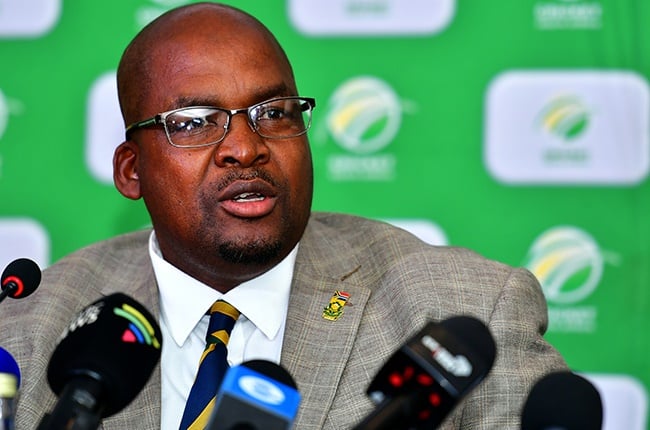


Cricket SA president Chris Nenzani during a media briefing at OR Tambo International Airport in Johannesburg on 7 December 2019.
Johan Rynners/Gallo Images)
Cricket South Africa’s (CSA) president Chris Nenzani and 40 black former Proteas cricketers and senior coaches met in a video meeting on Sunday.
According to a statement released by the organisation on Wednesday, the meeting served as an opportunity for CSA to “hear first-hand from the group of players about their experiences and opinions on how CSA should proceed in its efforts to address the substantive shortcomings in the cricket system.”
On 14 July, with the Black Lives Matter movement having gained traction around the globe, a letter signed by 30 former black Proteas had presented a united stand against what was identified as a long history of systemic racism and discrimination in cricket.
CSA has since launched its Cricket for Social Justice and Nation Building (SJN) project, which aims to eradicate any racism, discrimination or feelings of exclusion from cricket, and plans around this formed a significant part of Sunday’s meeting.
Included in that strategy is the establishment of an Independent Transformation Ombudsman whose core function will include the independent management of the complaints system, convening a national SJN Imbizo and providing a success measurement instrument on the extent of the success of the CSA transformation programmes.
In the statement, CSA stressed that the national outcry regarding the treatment of black players and the support of the movement has presented an opportunity for the cricket community to urgently respond to transformation with an informed and integrated transformation strategy.
Sunday’s meeting saw an acknowledgement that certain wrongs were committed in South African cricket and that a process to correct them was necessary and urgent.
The consensus was that, collectively, CSA and the players will drive a process of redress.
CSA’s renewal, restoration and transformation process will be led by the chairperson of the transformation committee, Dr Eugenia Kula-Ameyaw.
Nenzani said that this is a deliberate effort to continue the difficult conversations with all stakeholders with the goal of ultimately achieving a broad consensus.
When players asked about the guarantee of success of the SJN, Kula-Ameyaw stated: “the critical success factor of the SJN project is for the players and stakeholders to hold the CSA Board accountable for delivery.”
The participants agreed that the meeting was constructive and that a joint statement be issued.
“We would like to thank CSA for hearing our cry, reaching out and have an initial engagement,” the players and coaches said in a joint statement.
However, they cautioned that this was only a first step in the process, noting that they had not been included in the planning for the SJN framework.
“We don’t feel any new projects should be unilaterally embarked upon until honest and thorough robust conversations have taken place,” they said.
The group also expressed their disappointment that some of CSA’s operational staff, especially the Director of Cricket, the Cricket Manager and senior coaches, who would eventually be responsible for the implementation of the ‘new way’, were not part of the discussion.
They requested that these individuals form part of all future engagements so that clarity and broad agreement would be ensured on future strategies, driven by value and culture.
While recognising that the discussion was introductory and exploratory, the group felt that some robust discussions needed to take place before implementing the plan of action.
“This process going forward will draft in representatives from the former players, such that it is an inclusive and result-oriented process. When we embarked on this journey, we knew it was an emotive process and that it would elicit a difficult conversation,” Nenzani added.
– Compiled by Sport24 staff

